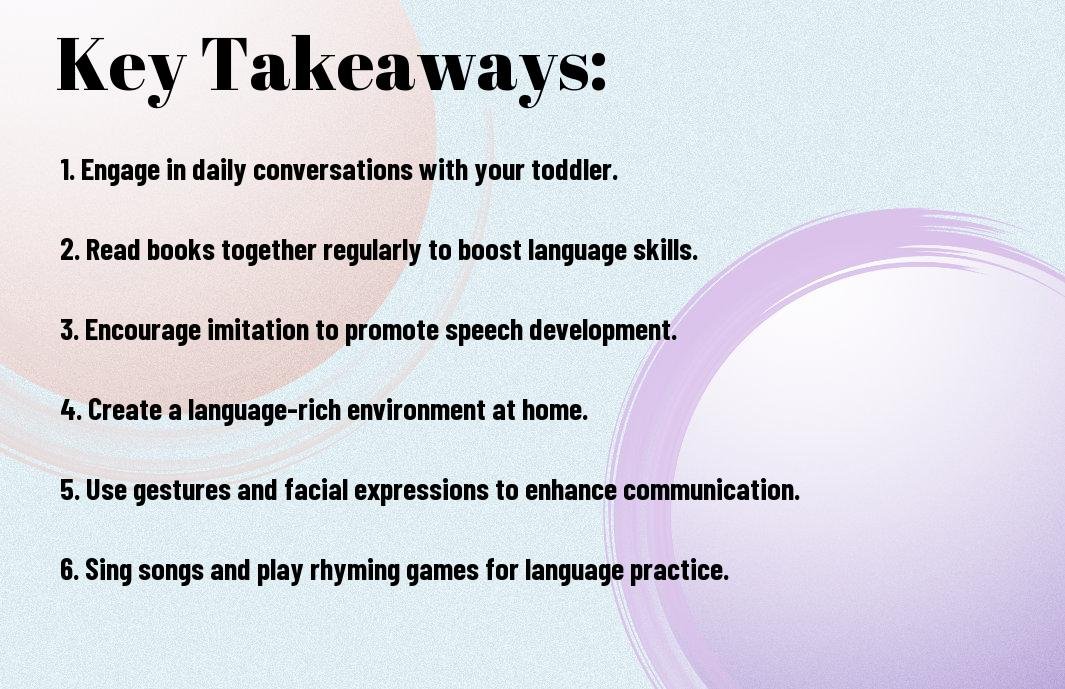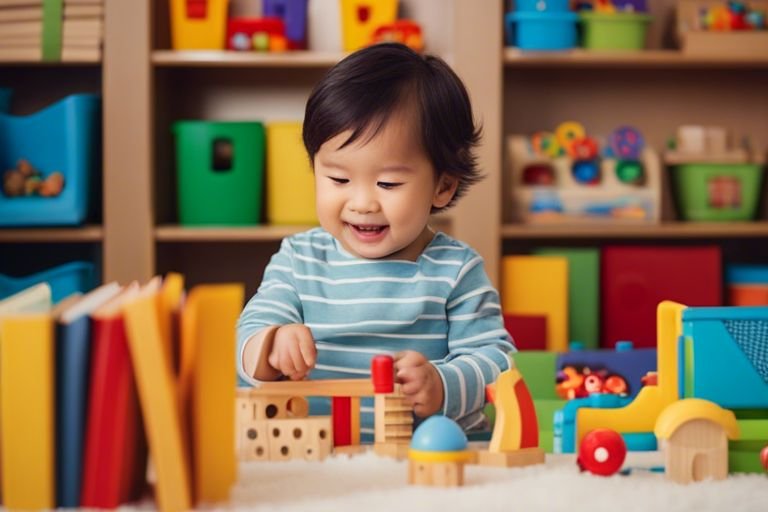You, as a parent, play a crucial role in nurturing your toddler’s speech development. Simple, everyday activities can make a significant impact on their language skills. From reading and singing to engaging in conversations and expanding their vocabulary through play, there are plenty of fun and natural ways to support your little one’s communication abilities. Let’s explore some effective strategies to enhance your toddler’s speech development organically.
Table of Contents
Key Takeaways:
- Engage in Conversations: Regularly talk to your toddler and engage in back-and-forth conversations to help them develop their speech skills naturally.
- Read Aloud: Reading aloud to your toddler can expose them to different sounds, vocabulary, and language patterns, supporting their speech development.
- Play Word Games: Incorporate word games like rhyming or naming objects into your daily routine to make learning fun and interactive for your toddler.
- Limit Screen Time: Reduce screen time and encourage face-to-face interactions to promote language development in toddlers.
- Provide a Language-Rich Environment: Surround your toddler with books, music, and opportunities for social interactions to foster their speech development naturally.

Creating a Language-Rich Environment
Talk, Talk, Talk: The Power of Conversation
Before delving into specific activities, remember the foundation of language development – conversation. Regularly engage in conversations with your toddler. Ask questions, wait for their responses, and provide meaningful feedback. This back-and-forth interaction is crucial for language acquisition.
Reading Aloud: A Gateway to Vocabulary and Imagination
Power up your toddler’s language skills through the magic of storytelling. Reading aloud introduces your little one to new words, concepts, and worlds. It ignites their imagination and sparks a love for books early on.
This activity not only broadens their vocabulary but also enhances listening skills and attention span. Choose books with colorful illustrations, engaging narratives, and repetitive phrases to make the experience interactive and enjoyable.
Encouraging Communication
There’s no doubt that encouraging communication in toddlers is crucial for their speech development. For more tips on how to improve your toddler’s speech, you can check out How to improve my toddler’s speech on Quora.
Responding to Babble: Validating Your Toddler’s Attempts
Communication: Responding positively to your toddler’s babbling not only shows them that you’re interested in what they have to say but also encourages them to keep trying to communicate. This validation of their efforts can significantly boost their confidence in speaking.
Labeling and Expanding: Building Vocabulary and Sentences
Attempts: A great way to enhance your toddler’s vocabulary is by labeling objects and actions while engaging with them. This practice helps them link words to objects or activities, expanding their vocabulary naturally.
For instance, when your toddler points to a dog, you can say, “Yes, that’s a big brown dog!” This not only labels the object but also adds descriptive words to enrich their understanding and language skills.
Asking Open-Ended Questions: Fostering Curiosity and Expression
Validating: Encouraging your toddler to express themselves by asking open-ended questions can spark their curiosity and help them articulate their thoughts. This back-and-forth exchange fosters a deeper level of communication and shows them that their opinions and ideas are valued.
Questions: When your toddler shows interest in something, you can ask questions like, “What do you think about that?” or “Why do you like it?” These queries prompt your child to think critically and express their feelings, promoting a more interactive and engaging conversation.

Building Vocabulary Naturally
Pointing and Naming: Associating Words with Objects
Your toddler can learn new words by pointing at objects and naming them. This simple activity helps them associate words with the objects they encounter every day.
Singing Songs and Reciting Nursery Rhymes: Rhythm and Repetition
On top of being fun, singing songs and reciting nursery rhymes provide a rhythmic and repetitive way for toddlers to absorb new words and phrases.
Naturally, children are drawn to music, making this method an enjoyable way to enhance their vocabulary and language skills.
Using Real Objects: Making Learning Concrete and Fun
For a hands-on approach to learning, introduce real objects to your toddler. By touching, feeling, and interacting with them, your child can make concrete connections between words and objects.
Making learning a tangible experience can engage your toddler’s senses and boost their understanding of language in a fun and interactive way.
Imitation and Mirroring
Mirroring Your Toddler’s Gestures and Facial Expressions
Gestures: Despite being simple actions, mirroring your toddler’s gestures and facial expressions can greatly support their speech development. By imitating their movements, you are showing them that you are actively engaged in their communication.
Imitating Their Babble: Encouraging Turn-Taking and Conversation
Gestures: When your toddler babbles, take the opportunity to imitate their sounds and respond. This encourages turn-taking and lays the foundation for future conversations.
Their: By mimicking their babble, you are validating their attempts at communication and building their confidence to continue vocalizing. This back-and-forth interaction fosters a sense of connection and encourages them to engage in verbal exchanges.
Using Mirrors: Exploring Identity and Self-Awareness
Mirroring: Introducing mirrors into your toddler’s play area can be an engaging way to explore identity and self-awareness. Encourage them to make faces, point to body parts, and vocalize as they see their reflection.
TurnTaking: Through mirror play, toddlers can practice turn-taking as they mimic their own movements and expressions. This activity not only enhances their speech development but also promotes self-recognition and emotional expression.
Reducing Screen Time and Promoting Interactive Play
All Speech Therapy Activities For Toddlers – Speak Eat Learn point to the importance of reducing screen time and promoting interactive play when supporting your toddler’s speech development naturally. Screens can hinder communication and social skills, making interactive play crucial for language growth.
The Importance of Face-to-Face Interaction
To foster speech development in toddlers, prioritize face-to-face interactions. Verbal and non-verbal cues are key to language acquisition. Communicating directly with your child helps them learn language more effectively and builds a strong foundation for their communication skills.
Engaging in Play: Building Relationships and Language Skills
FacetoFace, interactive play is a powerful tool for building relationships and enhancing language skills in toddlers. Play promotes bonding between parent and child while also encouraging speech development through conversation, storytelling, and vocabulary expansion.
For instance, engaging in pretend play like playing house or tea parties encourages your toddler to use words, phrases, and sentences in context. This type of play also helps children understand the give-and-take of conversation and strengthens their social skills.
Creating a Screen-Free Zone: Designating Language-Rich Areas
Relationships with strong language-rich areas free of screens are vital for your toddler’s language development. Designate specific areas in your home as screen-free zones where you can interact with your child through speaking, reading, and engaging in language-boosting activities.
Promoting a screen-free zone allows your child to focus on language input from their surroundings and encourages meaningful interactions that support their speech and language skills.

Using Everyday Routines to Support Speech Development
Mealtime Conversations: Sharing Experiences and Vocabulary
Many toddlers enjoy mealtime as it allows for valuable opportunities to engage in conversations. The shared experience of eating together provides a natural setting to introduce new words. Encourage your child to talk about the food, express preferences, and describe flavors and textures. This not only enhances vocabulary but also fosters communication skills.
Bath Time Chatter: Creating Opportunities for Language Practice
Practice creating a language-rich environment during bath time by describing the actions and objects involved. Engage your toddler in conversation by asking open-ended questions or labeling body parts and bath toys. This interactive time can help strengthen language skills and facilitate bonding moments.
Support your toddler’s language development by introducing new words, encouraging them to repeat after you, and praising their efforts. Utilize bath time as a fun and educational experience to enhance their communication skills while creating a strong parent-child connection.
Using Daily Activities: Turning Mundane Tasks into Learning Moments
Conversations during daily activities such as dressing, cleaning, or grocery shopping can significantly impact your toddler’s speech development. To make the most of these moments, describe what you are doing, ask simple questions, and patiently wait for your child to respond. By incorporating language practice into daily routines, you can support your toddler’s speech development in a natural and meaningful way.
Conclusion
Drawing together from everyday activities to specialized exercises, it is clear that supporting your toddler’s speech development can be a natural and enjoyable journey. By incorporating these ideas into your daily routine, you can foster language skills in a fun and interactive way, helping your child reach important milestones while building a strong foundation for future communication.
FAQ
Q: Why is supporting my toddler’s speech development important?
A: Supporting your toddler’s speech development is crucial for their overall communication skills, social interactions, and future academic success.
Q: How can I naturally support my toddler’s speech development?
A: You can support your toddler’s speech development naturally through everyday activities, such as reading books, singing songs, talking to them, and engaging in interactive play.
Q: What are some tips for encouraging my toddler to talk more?
A: Encourage your toddler to talk more by asking open-ended questions, waiting for their responses, and praising their attempts at communication.
Q: Are there specific activities that can help boost my toddler’s speech development?
A: Yes, activities like reading together, playing with toys that promote language skills, and engaging in pretend play can all help boost your toddler’s speech development.
Q: When should I be concerned about my toddler’s speech development?
A: If you have concerns about your toddler’s speech development, such as limited vocabulary, difficulty understanding instructions, or persistent speech delays, it’s important to consult with a pediatrician or speech therapist for further evaluation and support.
Recent Posts
Revitalize your health with an innovative detox approach offered by Root Wellness. This powerful solution enhances wellness through natural ingredients like zeolite and silica, effectively cleansing...
Roots Clean Slate Erfahrungen Revitalize With Bioavailable Silicon
Revitalizing your health begins with a natural approach to removing harmful substances. Detoxification can pave the way for a more vibrant life through effective cleansing methods. Bioavailable...


